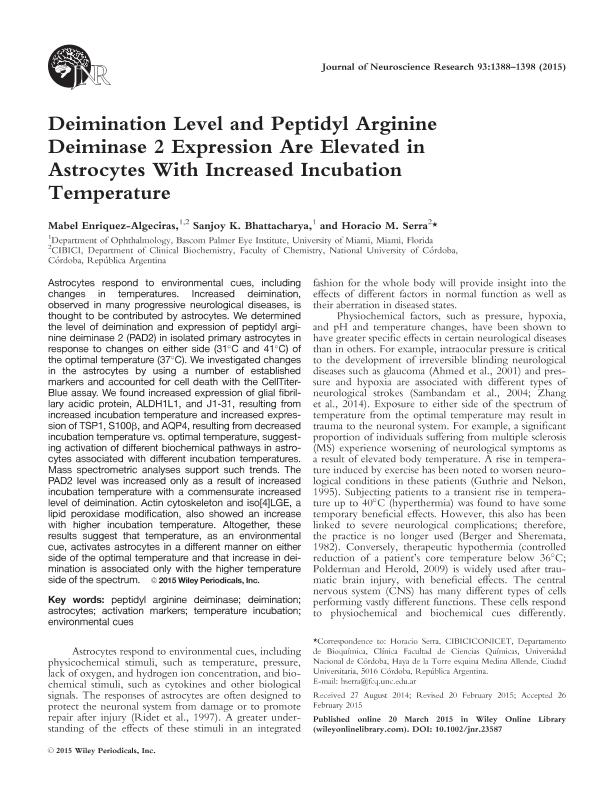Mostrar el registro sencillo del ítem
dc.contributor.author
Enriquez Algeciras, Mabel
dc.contributor.author
Bhattacharya, Sanjoy K.
dc.contributor.author
Serra, Horacio Marcelo

dc.date.available
2018-05-24T13:24:42Z
dc.date.issued
2015-09
dc.identifier.citation
Enriquez Algeciras, Mabel; Bhattacharya, Sanjoy K.; Serra, Horacio Marcelo; Deimination level and peptidyl arginine deiminase 2 expression are elevated in astrocytes with increased incubation temperature; Wiley-liss, Div John Wiley & Sons Inc; Journal of Neuroscience Research; 93; 9; 9-2015; 1388-1398
dc.identifier.issn
0360-4012
dc.identifier.uri
http://hdl.handle.net/11336/46047
dc.description.abstract
Astrocytes respond to environmental cues, including changes in temperatures. Increased deimination, observed in many progressive neurological diseases, is thought to be contributed by astrocytes. We determined the level of deimination and expression of peptidyl arginine deiminase 2 (PAD2) in isolated primary astrocytes in response to changes on either side (31°C and 41°C) of the optimal temperature (37°C). We investigated changes in the astrocytes by using a number of established markers and accounted for cell death with the CellTiter‐Blue assay. We found increased expression of glial fibrillary acidic protein, ALDH1L1, and J1‐31, resulting from increased incubation temperature and increased expression of TSP1, S100β, and AQP4, resulting from decreased incubation temperature vs. optimal temperature, suggesting activation of different biochemical pathways in astrocytes associated with different incubation temperatures. Mass spectrometric analyses support such trends. The PAD2 level was increased only as a result of increased incubation temperature with a commensurate increased level of deimination. Actin cytoskeleton and iso[4]LGE, a lipid peroxidase modification, also showed an increase with higher incubation temperature. Altogether, these results suggest that temperature, as an environmental cue, activates astrocytes in a different manner on either side of the optimal temperature and that increase in deimination is associated only with the higher temperature side of the spectrum.
dc.format
application/pdf
dc.language.iso
eng
dc.publisher
Wiley-liss, Div John Wiley & Sons Inc

dc.rights
info:eu-repo/semantics/openAccess
dc.rights.uri
https://creativecommons.org/licenses/by-nc-sa/2.5/ar/
dc.subject
Astrocitos
dc.subject
Pad
dc.subject
Glaucoma
dc.subject.classification
Inmunología

dc.subject.classification
Medicina Básica

dc.subject.classification
CIENCIAS MÉDICAS Y DE LA SALUD

dc.title
Deimination level and peptidyl arginine deiminase 2 expression are elevated in astrocytes with increased incubation temperature
dc.type
info:eu-repo/semantics/article
dc.type
info:ar-repo/semantics/artículo
dc.type
info:eu-repo/semantics/publishedVersion
dc.date.updated
2018-05-22T21:47:36Z
dc.identifier.eissn
1097-4547
dc.journal.volume
93
dc.journal.number
9
dc.journal.pagination
1388-1398
dc.journal.pais
Estados Unidos

dc.journal.ciudad
New York
dc.description.fil
Fil: Enriquez Algeciras, Mabel. Consejo Nacional de Investigaciones Científicas y Técnicas. Centro Científico Tecnológico Córdoba. Centro de Investigaciones en Bioquímica Clínica e Inmunología; Argentina. Miami University; Estados Unidos
dc.description.fil
Fil: Bhattacharya, Sanjoy K.. Miami University; Estados Unidos
dc.description.fil
Fil: Serra, Horacio Marcelo. Consejo Nacional de Investigaciones Científicas y Técnicas. Centro Científico Tecnológico Córdoba. Centro de Investigaciones en Bioquímica Clínica e Inmunología; Argentina
dc.journal.title
Journal of Neuroscience Research

dc.relation.alternativeid
info:eu-repo/semantics/altIdentifier/url/https://bit.ly/2II2n5O
dc.relation.alternativeid
info:eu-repo/semantics/altIdentifier/doi/http://dx.doi.org/10.1002/jnr.23587
Archivos asociados
